The great homework debate
by: Christina Tynan-Wood | Updated: October 16, 2018
Print article
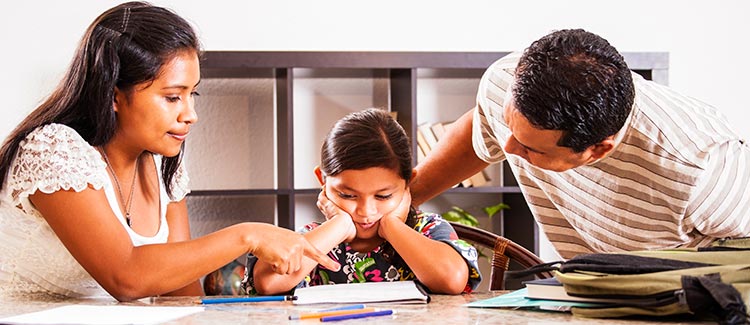
Your first grader is in the middle of a tea party with six of her stuffed animals. It seems to be going well, despite a recent argument between the stuffed giraffe and his zebra stepbrother. You are enjoying eavesdropping on the dialogue as you clean up the dinner dishes, but it’s time for homework. You dutifully get your child set up at her study spot and redirect her attention to a worksheet of math facts. “I hate homework!” she wails , after an hour of struggle and avoidance. Exhausted and frustrated, you are inclined to agree with her .
Your child is not the only one howling about this nightly ritual. The debate over homework has been going on for decades, with the pendulum swinging back and forth between more and less homework for American students. Adding new fuel to the debate is that today’s kids are getting more homework in earlier grades. “The amount of homework that younger kids – ages 6 to 9 – have to do has gone up astronomically since the late ’80s,” says Alfie Kohn, author of the 2006 book The Homework Myth: Why Our Kids Get Too Much of a Bad Thing .
Homework detractors point to research that shows homework has no demonstrated benefits for students in the early elementary grades. They say younger students are not developmentally ready to learn the time management and work habits that nightly homework is assumed to teach, and that having grades depend on homework penalizes low-income students who may not have the resources at home to support nightly study sessions. On the pro-homework side are educators and parents who say that homework is necessary for reinforcing the lessons learned during the school day and that doing homework prepares kids for the work they’ll have in middle school, high school, and college.

Too young for nightly homework
Kohn falls solidly in the no-homework camp. He argues that homework in the elementary school years is more likely to drive students away from learning than to improve academic outcomes. What’s more, he says, time spent on homework is time not spent doing important activities like play, rest, and family time. He’s not alone in his view.
“The research clearly shows that there is no correlation between academic achievement and homework, especially in the lower grades,” says Denise Pope, senior lecturer at the Stanford University Graduate School of Education and the author of the 2015 book, Overloaded and Underprepared: Strategies for Stronger Schools and Healthy Successful Kids .
“Homework only really helps in high school,” agrees Heather Shumaker, author of It’s OK to Go Up the Slide . “In elementary school, there is no evidence that it has academic benefit. And yet, we are piling it on more and more, younger and younger.”
Some elementary schools have made headlines in recent years by announcing no-homework policies. Gaithersburg Elementary School in Maryland issued a ban on homework in 2012, asking students to read at home each evening instead. Last year, the principal of New York elementary school P.S. 116 sent home a letter to parents explaining why students would not be assigned any homework.
But it’s not clear how widespread the trend is. “We tried to study what school districts have homework policies. But there are thousands of school districts in the U.S. It is very difficult to know what schools are doing,” says Gerald Le Tendre, Head of Education Policy Studies at Pennsylvania State University and co-author of Promoting and Sustaining a Quality Teacher Workforce .
The pro-homework camp
Parents are among the most vocal detractors of banning or reducing homework in the elementary school grades. “Some teachers would like to not give homework,” says Shumaker. “But they are pressured to do it by either by administrators or parents. Parents want what is best for their kids. And many of them think having homework is it.”
Le Tendre agrees. “The amount of homework gets equated with some sort of academic rigor,” he explains. “Though I have seen nothing to support that idea.” But that doesn’t mean that all work done at home is bad. “If you have a highly motivated kid who loves mathematics and loves spending hours every night on Kahn Academy, they can get substantial benefit from doing homework,” says Le Tendre.
Studies show that homework has positive effects for certain students under certain conditions. For example, students with learning disabilities can benefit from homework if they have the support they need to complete it. Middle and high school students benefit from doing homework, though high school students get more benefit more than middle schoolers, and more homework definitely isn’t better — too much homework (more than about an hour and a half a night for middle schoolers and more than two and a half hours for high schoolers) has been shown to negatively affect academic performance.
And if the assigned homework is to spend time reading for pleasure, no one is likely to argue with that. “One thing we know does have a correlation with academic achievement is free reading time,” says Pope. “We know that that is something we want schools to encourage.”
In praise of purposeful homework
Points and counterpoints aside, elementary school homework is probably not going to disappear any time soon. But that doesn’t mean that your child should struggle with those worksheets beyond a reasonable amount of time. The National PTA’s research-based recommendation is ten to twenty minutes of homework a night in first grade and an additional ten minutes per grade level thereafter. If your child’s homework takes longer than that, tell their teacher. (The teacher can’t know that homework is a tear-filled, hours-long event that is making your child dread school if you don’t tell her.) Work with the teacher to make sure that the homework your child receives is appropriate for them. Homework should be challenging enough to be thought-provoking, rather than just busy work, and your child should be able to complete it independently and successfully most of the time.
Make sure you understand the teacher’s goal for assigning homework. Is the purpose of a particular assignment to review a concept covered in class? Get extra practice at a skill your child is working on mastering? Explore a topic further, according to your child’s interest? When homework is purposeful and assigned in an amount and at a difficulty level that is appropriate for your child, it will likely be easier to incorporate into your home life — and less likely to negatively affect your child’s attitude toward school.
And happily, if your child’s homework is to read for pleasure, you won’t have to ask her to put away her toys and sit down to a worksheet. Ask her to read a story to her friends while they have tea instead. Everyone will be happier.
Homes Nearby
Homes for rent and sale near schools

Why your neighborhood school closes for good – and what to do when it does

How our schools are (and aren't) addressing race

The truth about homework in America
Yes! Sign me up for updates relevant to my child's grade.
Please enter a valid email address
Thank you for signing up!
Server Issue: Please try again later. Sorry for the inconvenience
Is Homework Good for Kids? Here’s What the Research Says
A s kids return to school, debate is heating up once again over how they should spend their time after they leave the classroom for the day.
The no-homework policy of a second-grade teacher in Texas went viral last week , earning praise from parents across the country who lament the heavy workload often assigned to young students. Brandy Young told parents she would not formally assign any homework this year, asking students instead to eat dinner with their families, play outside and go to bed early.
But the question of how much work children should be doing outside of school remains controversial, and plenty of parents take issue with no-homework policies, worried their kids are losing a potential academic advantage. Here’s what you need to know:
For decades, the homework standard has been a “10-minute rule,” which recommends a daily maximum of 10 minutes of homework per grade level. Second graders, for example, should do about 20 minutes of homework each night. High school seniors should complete about two hours of homework each night. The National PTA and the National Education Association both support that guideline.
But some schools have begun to give their youngest students a break. A Massachusetts elementary school has announced a no-homework pilot program for the coming school year, lengthening the school day by two hours to provide more in-class instruction. “We really want kids to go home at 4 o’clock, tired. We want their brain to be tired,” Kelly Elementary School Principal Jackie Glasheen said in an interview with a local TV station . “We want them to enjoy their families. We want them to go to soccer practice or football practice, and we want them to go to bed. And that’s it.”
A New York City public elementary school implemented a similar policy last year, eliminating traditional homework assignments in favor of family time. The change was quickly met with outrage from some parents, though it earned support from other education leaders.
New solutions and approaches to homework differ by community, and these local debates are complicated by the fact that even education experts disagree about what’s best for kids.
The research
The most comprehensive research on homework to date comes from a 2006 meta-analysis by Duke University psychology professor Harris Cooper, who found evidence of a positive correlation between homework and student achievement, meaning students who did homework performed better in school. The correlation was stronger for older students—in seventh through 12th grade—than for those in younger grades, for whom there was a weak relationship between homework and performance.
Cooper’s analysis focused on how homework impacts academic achievement—test scores, for example. His report noted that homework is also thought to improve study habits, attitudes toward school, self-discipline, inquisitiveness and independent problem solving skills. On the other hand, some studies he examined showed that homework can cause physical and emotional fatigue, fuel negative attitudes about learning and limit leisure time for children. At the end of his analysis, Cooper recommended further study of such potential effects of homework.
Despite the weak correlation between homework and performance for young children, Cooper argues that a small amount of homework is useful for all students. Second-graders should not be doing two hours of homework each night, he said, but they also shouldn’t be doing no homework.
Not all education experts agree entirely with Cooper’s assessment.
Cathy Vatterott, an education professor at the University of Missouri-St. Louis, supports the “10-minute rule” as a maximum, but she thinks there is not sufficient proof that homework is helpful for students in elementary school.
“Correlation is not causation,” she said. “Does homework cause achievement, or do high achievers do more homework?”
Vatterott, the author of Rethinking Homework: Best Practices That Support Diverse Needs , thinks there should be more emphasis on improving the quality of homework tasks, and she supports efforts to eliminate homework for younger kids.
“I have no concerns about students not starting homework until fourth grade or fifth grade,” she said, noting that while the debate over homework will undoubtedly continue, she has noticed a trend toward limiting, if not eliminating, homework in elementary school.
The issue has been debated for decades. A TIME cover in 1999 read: “Too much homework! How it’s hurting our kids, and what parents should do about it.” The accompanying story noted that the launch of Sputnik in 1957 led to a push for better math and science education in the U.S. The ensuing pressure to be competitive on a global scale, plus the increasingly demanding college admissions process, fueled the practice of assigning homework.
“The complaints are cyclical, and we’re in the part of the cycle now where the concern is for too much,” Cooper said. “You can go back to the 1970s, when you’ll find there were concerns that there was too little, when we were concerned about our global competitiveness.”
Cooper acknowledged that some students really are bringing home too much homework, and their parents are right to be concerned.
“A good way to think about homework is the way you think about medications or dietary supplements,” he said. “If you take too little, they’ll have no effect. If you take too much, they can kill you. If you take the right amount, you’ll get better.”
More Must-Reads From TIME
- The 100 Most Influential People of 2024
- How Far Trump Would Go
- Why Maternity Care Is Underpaid
- Scenes From Pro-Palestinian Encampments Across U.S. Universities
- Saving Seconds Is Better Than Hours
- Why Your Breakfast Should Start with a Vegetable
- Welcome to the Golden Age of Ryan Gosling
- Want Weekly Recs on What to Watch, Read, and More? Sign Up for Worth Your Time
Write to Katie Reilly at [email protected]
The Great Homework Debate
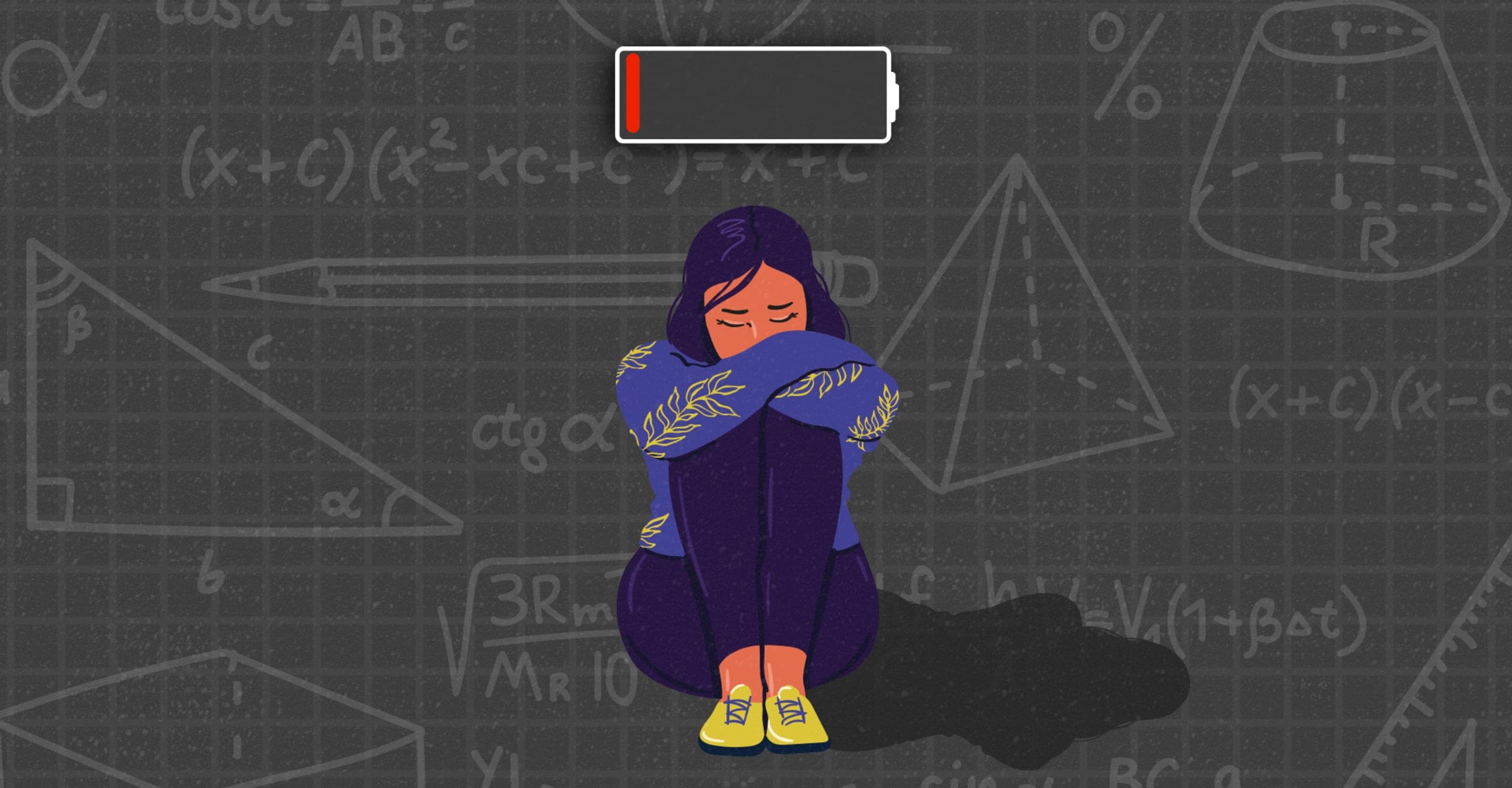
What is the right amount of homework for school children, and should it be given at all? Expert in social psychology, Harris Cooper, explains what schools, parents and students need to consider.
- Request Info

- B.A. in Professional Studies
- B.S. in Business Administration & Leadership
- See All Business
- B.A. in Education Studies
- See All Education
- B.S. in Healthcare Administration
- See All Healthcare
- See All Leadership
- See All Nursing
- See All Bachelor's
- Business Programs
- Certificate in Adult Education and Corporate Training
- Certificate in Content Area Instruction
- Certificate in Principal Preparation
- Certificate in Teaching English Learners
- Certificate in Transition to Teaching in Elementary Education
- Certificate in Transition to Teaching in Secondary Education
- Florida Educational Leadership Program
- Healthcare Programs
- Certificate in Advanced Graduate Study
- Certificate in Teacher Leadership
- Certificate in Texas Educational Leadership
- Nursing Programs
- See All Certificates
- Ed.D. in Curriculum and Instruction
- Ed.D. in Early Childhood Education
- Ed.D. in Instructional Technology
Ed.D. in Leadership
- Ed.D. in Second Language Instruction
- Ed.D. in Special Education
- Ed.D. in Public Health Education
- Ed.D. in Nursing Education
- See All Doctoral
- Ed.S. in Curriculum and Instruction
- Ed.S. in Early Childhood Education
- Ed.S. in Instructional Technology
- Ed.S. in Second Language Instruction
- Ed.S. in Special Education
- Ed.S. in Public Health Education
- Ed.S. in Leadership
- Ed.S. in Nursing Education
- See All Education Specialist
- M.Ed. in Educational Business Administration
- M.S. in Organizational Leadership
- M.A. in Elementary Teaching
- M.A. in Secondary Teaching
- M.Ed. in Adult Education and Training
- M.Ed. in Advanced Studies
- M.Ed. in Biology Education
- M.Ed. in Chemistry Education
- M.Ed. in Curriculum and Instruction
- M.Ed. in Early Childhood Education
- M.Ed. in Educational Leadership
- M.Ed. in Educational Technology
- M.Ed. in Elementary Education
- M.Ed. in English Education
- M.Ed. in Health and Wellness Education
- M.Ed. in Higher Education
- M.Ed. in History Education
- M.Ed. in Instructional Design and Technology
- M.Ed. in Integrated Curriculum
- M.Ed. in Literacy
- M.Ed. in Mathematics Education
- M.Ed. in Science Education
- M.Ed. in Social Science Education
- M.Ed. in Special Education
- M.Ed. in STEM Education
- M.Ed. in Teacher Leadership
- M.Ed. in Teaching English Learners
- Master of Healthcare Administration
- Master of Public Health
- See All Master's
- Micro-Credential in Early Childhood Special Education
- Micro-Credential in Learning Behavior Specialist 1
- Micro-Credential in Public Health and Health Leadership
- Leadership Programs
- See All Micro-credentials
- Find Your Course
- See All Courses
- Find Your Program
- Academic Calendar
- Payment Options
- Grants and Scholarships
- Virtual Open House
- Education Solutions
- K-12 Education Partners
- Academic Partners
- Community College Partners
- Healthcare Partners
- Business Partners
- Non-profit Partners
- Support Services
- Tuition & Tech Support
- Alumni Achievement Award
- Success Stories
- Current Catalog
- Internship and Student Teaching
- Commencement
- Accreditation
- History and Mission
- Rankings and Accolades
- Social Responsibility
- Student Right to Know
- Annual Reports
- Regulatory Affairs
- Content Resources
- Education Specialist
- Certificates
- Micro-Credential
- Current Students
- MyACE Student Login
Make the World Your Classroom! Enroll by May 17 for the May 20 start and we'll credit $50-100 back to you! Enroll Today
The Great Homework Debate
October 10, 2023

As your students file out of your classroom, you quickly shout, “Don’t forget to complete pages four and five tonight for homework!” You sigh wondering if that homework will get done. It’s the great debate, to assign or not assign homework, that is the question.
There are pros, cons and compromises in this debate, so let’s dive in.
Homework is a great home-to-school connection that allows parents to understand what their students are working on in class. It also serves as a way to have them involved and be part of the learning team. Homework after school helps foster time management of assignments and other things going on outside of school.
Students and parents already have full plates in the evenings. As educators, we don’t enjoy taking work home either. Rushing to sports practice and extracurriculars, parents and students are already stretched thin in the brief few hours between dismissal and bedtime. Should they really be spending this sacred time on homework?
There just are not enough hours in the school day. Giving homework means that students have extra time to practice skills, engage with content and independently demonstrate what they have learned beyond the constraints of the school day.
For struggling students, homework contributes to feelings of failure and frustration. Reversing the ways that students have incorrectly understood a topic put more on the teacher’s plate the following lesson. Additionally, we teach students differently than their parents do, so sending home math problems for example could result in students being taught a completely different method at home.
Consider making a weekly packet of a reasonable amount of work. Choose assignments that are meaningful and not just busy. Send the packet home on Monday to return it to school on Friday. Maybe set aside some time each morning for “Homework Club” and invite students to work on the packet as their morning warm up activity. This way if a student has outside school obligations, they can truly manage their time and complete the school assignments.
Dating back to 2012, there’s no current significant research that says there’s a positive correlation between homework completion and academic success. Given all the pros, cons and research, you still want to have students practice outside of the typical school day. You can meet in the middle and make homework doable for your students!
American College of Education was founded by educators, for educators. Education programs are available at all levels.

Amy has a strong passion for educating all learners and has over 12 years of experience in special education. She works on her family's dairy farm and is currently a doctoral candidate.
Share this:
Related posts, why some school leaders thrive when many only survive.
April 16, 2024
What's Next in Education: World Quantum Day and AI Recognition Days
April 09, 2024
Paraprofessionals: Recognizing and Supporting Their Role as a School Leader
March 19, 2024
School Leadership Behind-the-Scenes: Is Administration For You?
March 12, 2024
Authentic Interviews: Tips to Land Your Administrative Role
February 13, 2024
Things To Do | Should kids have homework? The great debate.
Share this:.
- Click to share on Facebook (Opens in new window)
- Click to share on X (Opens in new window)
- Click to print (Opens in new window)
- Click to email a link to a friend (Opens in new window)
- Music and Concerts
- The Theater Loop
- TV and Streaming
Things To Do

Some point to studies that find that appropriate take-home work in the right amounts can enhance younger students’ learning and prepare them for a routine of studying as they get older. But others say homework has little to do with academic achievement in elementary school and can get in the way of other life experiences like spending time with family and much needed downtime for often over-scheduled kids.
“There’s no one answer,” said Susan Goldman, professor of psychology and education at the University of Illinois at Chicago and co-director of the UIC Learning Sciences Research Institute. Homework “has to be taken in the context of who are the kids, who are the teachers, what kind of instructional time do they have in school and what kind of support do kids have for getting work done.”
“It’s a complex kind of situation,” Goldman added.
Homework isn’t effective if the student doesn’t understand the lesson during class time, she said. And often homework requires support at home, which isn’t practical for all students, Goldman said. However, if the homework has a clear purpose to all involved — parents, teachers and students — the child can benefit.
While the benefits of homework continue to be debated, there are clear camps on each side: Some tout an often cited 10-minutes-per-grade-level – per-day standard, while others shun homework altogether.
The case against homework
Education consultant James Gray instituted a no-homework policy at Hamilton Elementary School in Lakeview four years ago when he was principal of the Chicago public school.
“My perspective changed a lot after I had my own kids,” said Gray, whose two oldest children still attend Hamilton. He recalled a time when his daughter and wife were arguing about violin practice, reminding him of the family conflicts over homework time. While his daughter wasn’t required to play violin, many students are required to do homework.
“It made me think a lot about what schools do to families,” he said. “I heard from parents over the years about this massive fight that happens at night. It creates this antagonistic relationship between parent and child.”
“It didn’t seem worth it for what schools are trying to get out of homework,” Gray added.
After researching and finding little evidence that primary-level students benefit academically from homework, Gray decided to do away with homework at Hamilton in 2014. At first the policy applied to kindergartners through second-graders. Then it expanded through fourth grade and remains in place at the school, even though Gray left at the end of the 2016-17 school year.
“Kids can become disenchanted with school easily,” Gray said, explaining the additional family and relaxation time at night is actually better for young students.
“Learning happens all the time at home, whether you’re cooking a meal, playing a game or reading a book,” he said.
Gray’s policy was well-received, he said. While he was expecting some backlash, it didn’t come.
“Parents would tell me, ‘We played Clue last night, and it was so nice to sit down for an hour,’ or, ‘My child sat down and read a book on his own without being prompted.’”
Gray said he heard from parents and educators in other schools in Chicago and across the country wanting to create their own no-homework policies.
“I’m hoping (Hamilton’s policy) sticks around,” he said.
(function(d,s,id){var js,fjs=d.getElementsByTagName(s)[0];if(d.getElementById(id))return;js=d.createElement(s);js.id=id;js.src=’https://embed.playbuzz.com/sdk.js’;fjs.parentNode.insertBefore(js,fjs);}(document,’script’,’playbuzz-sdk’));
The case for homework
But others say homework shouldn’t go away completely, even for younger students.
Harris Cooper, professor of psychology and neuroscience at Duke University, has studied the correlation between homework and academic success. He said all students should have some homework, but the amount and type of homework should vary depending on age and developmental level.
Cooper said he believes in the 10-minutes-per-grade-level-per-day standard. Too much homework can bore students and take away from other valuable experiences, like after-school clubs and playtime, he said.
“This is not rocket science,” he said. “You may have brought home a pre-test for spelling on Thursday before you take a test on Friday, and you did better because you brought the pre-test home.”
While homework is not a significant predictor of academic success in early grades, Cooper said, it does create good study habits that will help students as they get older
“Is (homework) going to cause a great leap in (students’) achievement? No it is not,” he said. “What it’s really doing is shaping their behavior, so they begin to learn how to study at home.”
Cooper said homework also provides an opportunity for parents to tune into their child’s academic abilities and challenges. Instead of relying on a teacher to tell them, parents can see for themselves where their child might be struggling. It also can spark greater communication among parents, teachers and students, he said.
“With all young children, assignments should be short, simple and lead to success,” he said.
Twitter @knthayer
More in Things To Do

TV and Streaming | ‘Bodkin’ review: A true crime podcast descends upon rural Ireland, with mediocre results

Theater | A Red Orchid’s new play ‘Turret’ has a father’s ghost — and Michael Shannon trapped in a bunker

Movies | ‘Kingdom of the Planet of the Apes’ review: Simian, begin again
![A new family of COVID variants nicknamed “FLiRT” are spreading across the country, as vaccination rates in Chicago – as well as nationwide – remain concerningly low for some public health experts. While symptoms and severity seem to be about the same as previous COVID strains, the new FLiRT variants appear to be more transmissible, said infectious disease expert Dr. Robert Murphy. “A new more contagious variant is out there,” said Murphy, executive director of Northwestern University’s Institute for Global Health and a professor of infectious diseases at the Feinberg School of Medicine. “Covid-19 is still with us, and compared to […] A new family of COVID variants nicknamed “FLiRT” are spreading across the country, as vaccination rates in Chicago – as well as nationwide – remain concerningly low for some public health experts. While symptoms and severity seem to be about the same as previous COVID strains, the new FLiRT variants appear to be more transmissible, said infectious disease expert Dr. Robert Murphy. “A new more contagious variant is out there,” said Murphy, executive director of Northwestern University’s Institute for Global Health and a professor of infectious diseases at the Feinberg School of Medicine. “Covid-19 is still with us, and compared to […]](https://www.chicagotribune.com/wp-content/uploads/2024/05/ctc-l-vaccines04_176390743.jpg?w=517)
Health | New COVID ‘FLiRT’ variants are spreading nationwide. Chicago health experts urge up to date vaccination.
Trending nationally.
- Police: Videos show beating of 13-year-old girl. Kids chant ‘George Floyd’ as victim can’t breathe
- South Florida woman’s husband spray-painted cameras at her Madrid apartment, left with a suitcase, complaint says
- Advocates, historians urge rethinking Key Bridge name ‘for generations yet unborn’
- After 114 years, Boy Scouts of America is changing name to Scouting America
- NYC Mayor Adams: Rikers is ready for Trump if judge jails him over hush money trial gag order
Are You Down With or Done With Homework?
- Posted January 17, 2012
- By Lory Hough

The debate over how much schoolwork students should be doing at home has flared again, with one side saying it's too much, the other side saying in our competitive world, it's just not enough.
It was a move that doesn't happen very often in American public schools: The principal got rid of homework.
This past September, Stephanie Brant, principal of Gaithersburg Elementary School in Gaithersburg, Md., decided that instead of teachers sending kids home with math worksheets and spelling flash cards, students would instead go home and read. Every day for 30 minutes, more if they had time or the inclination, with parents or on their own.
"I knew this would be a big shift for my community," she says. But she also strongly believed it was a necessary one. Twenty-first-century learners, especially those in elementary school, need to think critically and understand their own learning — not spend night after night doing rote homework drills.
Brant's move may not be common, but she isn't alone in her questioning. The value of doing schoolwork at home has gone in and out of fashion in the United States among educators, policymakers, the media, and, more recently, parents. As far back as the late 1800s, with the rise of the Progressive Era, doctors such as Joseph Mayer Rice began pushing for a limit on what he called "mechanical homework," saying it caused childhood nervous conditions and eyestrain. Around that time, the then-influential Ladies Home Journal began publishing a series of anti-homework articles, stating that five hours of brain work a day was "the most we should ask of our children," and that homework was an intrusion on family life. In response, states like California passed laws abolishing homework for students under a certain age.
But, as is often the case with education, the tide eventually turned. After the Russians launched the Sputnik satellite in 1957, a space race emerged, and, writes Brian Gill in the journal Theory Into Practice, "The homework problem was reconceived as part of a national crisis; the U.S. was losing the Cold War because Russian children were smarter." Many earlier laws limiting homework were abolished, and the longterm trend toward less homework came to an end.
The debate re-emerged a decade later when parents of the late '60s and '70s argued that children should be free to play and explore — similar anti-homework wellness arguments echoed nearly a century earlier. By the early-1980s, however, the pendulum swung again with the publication of A Nation at Risk , which blamed poor education for a "rising tide of mediocrity." Students needed to work harder, the report said, and one way to do this was more homework.
For the most part, this pro-homework sentiment is still going strong today, in part because of mandatory testing and continued economic concerns about the nation's competitiveness. Many believe that today's students are falling behind their peers in places like Korea and Finland and are paying more attention to Angry Birds than to ancient Babylonia.
But there are also a growing number of Stephanie Brants out there, educators and parents who believe that students are stressed and missing out on valuable family time. Students, they say, particularly younger students who have seen a rise in the amount of take-home work and already put in a six- to nine-hour "work" day, need less, not more homework.
Who is right? Are students not working hard enough or is homework not working for them? Here's where the story gets a little tricky: It depends on whom you ask and what research you're looking at. As Cathy Vatterott, the author of Rethinking Homework , points out, "Homework has generated enough research so that a study can be found to support almost any position, as long as conflicting studies are ignored." Alfie Kohn, author of The Homework Myth and a strong believer in eliminating all homework, writes that, "The fact that there isn't anything close to unanimity among experts belies the widespread assumption that homework helps." At best, he says, homework shows only an association, not a causal relationship, with academic achievement. In other words, it's hard to tease out how homework is really affecting test scores and grades. Did one teacher give better homework than another? Was one teacher more effective in the classroom? Do certain students test better or just try harder?
"It is difficult to separate where the effect of classroom teaching ends," Vatterott writes, "and the effect of homework begins."
Putting research aside, however, much of the current debate over homework is focused less on how homework affects academic achievement and more on time. Parents in particular have been saying that the amount of time children spend in school, especially with afterschool programs, combined with the amount of homework given — as early as kindergarten — is leaving students with little time to run around, eat dinner with their families, or even get enough sleep.
Certainly, for some parents, homework is a way to stay connected to their children's learning. But for others, homework creates a tug-of-war between parents and children, says Liz Goodenough, M.A.T.'71, creator of a documentary called Where Do the Children Play?
"Ideally homework should be about taking something home, spending a few curious and interesting moments in which children might engage with parents, and then getting that project back to school — an organizational triumph," she says. "A nag-free activity could engage family time: Ask a parent about his or her own childhood. Interview siblings."

Instead, as the authors of The Case Against Homework write, "Homework overload is turning many of us into the types of parents we never wanted to be: nags, bribers, and taskmasters."
Leslie Butchko saw it happen a few years ago when her son started sixth grade in the Santa Monica-Malibu (Calif.) United School District. She remembers him getting two to four hours of homework a night, plus weekend and vacation projects. He was overwhelmed and struggled to finish assignments, especially on nights when he also had an extracurricular activity.
"Ultimately, we felt compelled to have Bobby quit karate — he's a black belt — to allow more time for homework," she says. And then, with all of their attention focused on Bobby's homework, she and her husband started sending their youngest to his room so that Bobby could focus. "One day, my younger son gave us 15-minute coupons as a present for us to use to send him to play in the back room. … It was then that we realized there had to be something wrong with the amount of homework we were facing."
Butchko joined forces with another mother who was having similar struggles and ultimately helped get the homework policy in her district changed, limiting homework on weekends and holidays, setting time guidelines for daily homework, and broadening the definition of homework to include projects and studying for tests. As she told the school board at one meeting when the policy was first being discussed, "In closing, I just want to say that I had more free time at Harvard Law School than my son has in middle school, and that is not in the best interests of our children."
One barrier that Butchko had to overcome initially was convincing many teachers and parents that more homework doesn't necessarily equal rigor.
"Most of the parents that were against the homework policy felt that students need a large quantity of homework to prepare them for the rigorous AP classes in high school and to get them into Harvard," she says.
Stephanie Conklin, Ed.M.'06, sees this at Another Course to College, the Boston pilot school where she teaches math. "When a student is not completing [his or her] homework, parents usually are frustrated by this and agree with me that homework is an important part of their child's learning," she says.
As Timothy Jarman, Ed.M.'10, a ninth-grade English teacher at Eugene Ashley High School in Wilmington, N.C., says, "Parents think it is strange when their children are not assigned a substantial amount of homework."
That's because, writes Vatterott, in her chapter, "The Cult(ure) of Homework," the concept of homework "has become so engrained in U.S. culture that the word homework is part of the common vernacular."
These days, nightly homework is a given in American schools, writes Kohn.
"Homework isn't limited to those occasions when it seems appropriate and important. Most teachers and administrators aren't saying, 'It may be useful to do this particular project at home,'" he writes. "Rather, the point of departure seems to be, 'We've decided ahead of time that children will have to do something every night (or several times a week). … This commitment to the idea of homework in the abstract is accepted by the overwhelming majority of schools — public and private, elementary and secondary."
Brant had to confront this when she cut homework at Gaithersburg Elementary.
"A lot of my parents have this idea that homework is part of life. This is what I had to do when I was young," she says, and so, too, will our kids. "So I had to shift their thinking." She did this slowly, first by asking her teachers last year to really think about what they were sending home. And this year, in addition to forming a parent advisory group around the issue, she also holds events to answer questions.
Still, not everyone is convinced that homework as a given is a bad thing. "Any pursuit of excellence, be it in sports, the arts, or academics, requires hard work. That our culture finds it okay for kids to spend hours a day in a sport but not equal time on academics is part of the problem," wrote one pro-homework parent on the blog for the documentary Race to Nowhere , which looks at the stress American students are under. "Homework has always been an issue for parents and children. It is now and it was 20 years ago. I think when people decide to have children that it is their responsibility to educate them," wrote another.
And part of educating them, some believe, is helping them develop skills they will eventually need in adulthood. "Homework can help students develop study skills that will be of value even after they leave school," reads a publication on the U.S. Department of Education website called Homework Tips for Parents. "It can teach them that learning takes place anywhere, not just in the classroom. … It can foster positive character traits such as independence and responsibility. Homework can teach children how to manage time."
Annie Brown, Ed.M.'01, feels this is particularly critical at less affluent schools like the ones she has worked at in Boston, Cambridge, Mass., and Los Angeles as a literacy coach.
"It feels important that my students do homework because they will ultimately be competing for college placement and jobs with students who have done homework and have developed a work ethic," she says. "Also it will get them ready for independently taking responsibility for their learning, which will need to happen for them to go to college."
The problem with this thinking, writes Vatterott, is that homework becomes a way to practice being a worker.
"Which begs the question," she writes. "Is our job as educators to produce learners or workers?"
Slate magazine editor Emily Bazelon, in a piece about homework, says this makes no sense for younger kids.
"Why should we think that practicing homework in first grade will make you better at doing it in middle school?" she writes. "Doesn't the opposite seem equally plausible: that it's counterproductive to ask children to sit down and work at night before they're developmentally ready because you'll just make them tired and cross?"
Kohn writes in the American School Board Journal that this "premature exposure" to practices like homework (and sit-and-listen lessons and tests) "are clearly a bad match for younger children and of questionable value at any age." He calls it BGUTI: Better Get Used to It. "The logic here is that we have to prepare you for the bad things that are going to be done to you later … by doing them to you now."
According to a recent University of Michigan study, daily homework for six- to eight-year-olds increased on average from about 8 minutes in 1981 to 22 minutes in 2003. A review of research by Duke University Professor Harris Cooper found that for elementary school students, "the average correlation between time spent on homework and achievement … hovered around zero."
So should homework be eliminated? Of course not, say many Ed School graduates who are teaching. Not only would students not have time for essays and long projects, but also teachers would not be able to get all students to grade level or to cover critical material, says Brett Pangburn, Ed.M.'06, a sixth-grade English teacher at Excel Academy Charter School in Boston. Still, he says, homework has to be relevant.
"Kids need to practice the skills being taught in class, especially where, like the kids I teach at Excel, they are behind and need to catch up," he says. "Our results at Excel have demonstrated that kids can catch up and view themselves as in control of their academic futures, but this requires hard work, and homework is a part of it."
Ed School Professor Howard Gardner basically agrees.
"America and Americans lurch between too little homework in many of our schools to an excess of homework in our most competitive environments — Li'l Abner vs. Tiger Mother," he says. "Neither approach makes sense. Homework should build on what happens in class, consolidating skills and helping students to answer new questions."
So how can schools come to a happy medium, a way that allows teachers to cover everything they need while not overwhelming students? Conklin says she often gives online math assignments that act as labs and students have two or three days to complete them, including some in-class time. Students at Pangburn's school have a 50-minute silent period during regular school hours where homework can be started, and where teachers pull individual or small groups of students aside for tutoring, often on that night's homework. Afterschool homework clubs can help.
Some schools and districts have adapted time limits rather than nix homework completely, with the 10-minute per grade rule being the standard — 10 minutes a night for first-graders, 30 minutes for third-graders, and so on. (This remedy, however, is often met with mixed results since not all students work at the same pace.) Other schools offer an extended day that allows teachers to cover more material in school, in turn requiring fewer take-home assignments. And for others, like Stephanie Brant's elementary school in Maryland, more reading with a few targeted project assignments has been the answer.
"The routine of reading is so much more important than the routine of homework," she says. "Let's have kids reflect. You can still have the routine and you can still have your workspace, but now it's for reading. I often say to parents, if we can put a man on the moon, we can put a man or woman on Mars and that person is now a second-grader. We don't know what skills that person will need. At the end of the day, we have to feel confident that we're giving them something they can use on Mars."
Read a January 2014 update.
Homework Policy Still Going Strong

Ed. Magazine
The magazine of the Harvard Graduate School of Education
Related Articles

Commencement Marshal Sarah Fiarman: The Principal of the Matter

Making Math “Almost Fun”
Alum develops curriculum to entice reluctant math learners

Reshaping Teacher Licensure: Lessons from the Pandemic
Olivia Chi, Ed.M.'17, Ph.D.'20, discusses the ongoing efforts to ensure the quality and stability of the teaching workforce
Headteacher-Trusted Tutoring
"This is one of the most effective interventions I have come across in my 27 years of teaching."
Free CPD and leadership support
All the latest guides, articles and news to help primary, secondary and trust leaders support your staff and pupils

The Great British Homework Debate 2024 – Is It Necessary At Primary School?
Alexander Athienitis
The homework debate is never much out of the news. Should homework be banned? Is homework at primary school a waste of time? Do our children get too much homework?
Not long ago, UK-based US comedian Rob Delaney set the world alight with a tweet giving his own personal view of homework at primary school. We thought, as an organisation that provides maths homework support on a weekly basis, it was time to look at the facts around the homework debate in primary schools as well as, of course, reflecting the views of celebrities and those perhaps more qualified to offer an opinion!
Here’s how Rob Delaney kicked things off

Gary Lineker leant his support with the following soundbite:
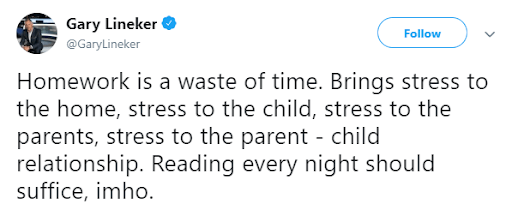
And even Piers Morgan weighed in, with his usual balance of tact and sensitivity:
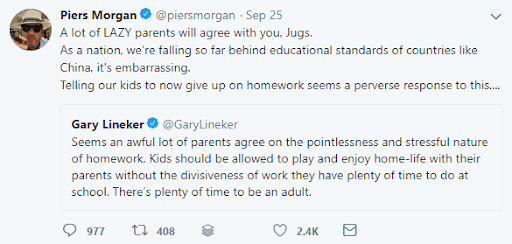
A very experienced and knowledgeable Headteacher, Simon Smith, who has a well-earned following on Twitter (for someone working in education, not hosting Match of the Day) also put his neck on the line and, some might think controversially, agreed with the golden-heeled Crisp King of Leicester…
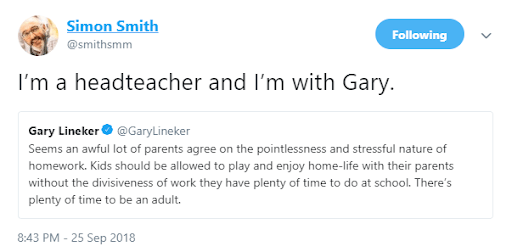
Fortunately Katharine Birbalsingh, Conservative Party Conference keynote speaker and Founding Headteacher of the Michaela School, was on hand to provide the alternative view on the importance of homework. Her op-ed piece in the Sun gave plenty of reasons why homework should not be banned.
She was informative and firm in her article stating: “Homework is essential for a child’s education because revisiting the day’s learning is what helps to make it stick.”

KS2 Maths Games and Activities Pack
A FREE downloadable games and activity pack, including 20 home learning maths activities for KS2 children to complete on their own or with a partner.
How much homework do UK primary school children get?
Sadly, there’s little data comparing how much homework primary school-aged children in the UK and across the globe complete on a weekly basis. A study of teenagers used by The Telegraph shows that American high-schoolers spend an average of 6.1 hours per week compared with 4.9 hours per week of homework each week for UK-based teens.
Up until 2012, the Department of Education recommended an hour of homework a week for primary school Key Stage 1 children (aged 4 to 7) and half an hour a day for primary school Key Stage 2 children (aged 7-11). Many primary schools still use this as a guideline.
Teachers, parents and children in many schools across the land have seen more changes of homework policy than numbers of terms in some school years.
A ‘no-homework’ policy pleases only a few; a grid of creative tasks crowd-sourced from the three teachers bothered to give their input infuriates many (parents, teachers and children alike). For some parents, no matter how much homework is set, it’s never enough; for others, even asking them to fill in their child’s reading record once a week can be a struggle due to a busy working life.

Homework is very different around the world
We’d suggest that Piers Morgan’s argument for homework in comparing the UK’s economic and social progress with China’s in recent years based on total weekly homework hours is somewhat misguided – we can’t put their emergence as the world’s (if not already, soon to be) leading superpower exclusively down to having their young people endure almost triple the number of hours spent completing homework as their Western counterparts.
Nonetheless, there’s certainly a finer balance to strike between the 14 hours a week suffered by Shanghainese school-attendees and none whatsoever. Certainly parents in the UK spend less time each week helping their children than parents in emerging economies such as India, Vietnam and Colombia (Source: Varkey Foundation Report).
Disadvantages of homework at primary school
Delaney, whose son attends a London state primary school, has made it plain that he thinks his kids get given too much homework and he’d rather have them following more active or creative pursuits: drawing or playing football. A father of four sons and a retired professional footballer Gary Linaker was quick to defend this but he also has the resources to send his children to top boarding schools which generally provide very structured homework or ‘prep’ routines.
As parents Rob and Gary are not alone. According to the 2018 Ofsted annual report on Parents Views more than a third of parents do not think homework in primary school is helpful to their children. They cite the battles and arguments it causes not to mention the specific challenges it presents to families with SEND children many of whom report serious damage to health and self-esteem as a result of too much or inappropriate homework.
It’s a truism among teachers that some types of homework tells you very little about what the child can achieve and much more about a parent’s own approach to the work. How low does your heart sink when your child comes back with a D & T project to create Stonehenge and you realise it’s either an all-nighter with glue, cardboard and crayons for you, or an uncompleted homework project for your child!

Speaking with our teacher hats on, we can tell you that homework is often cited in academic studies looking at academic progress in primary school-aged children as showing minimal to no impact.
Back on Twitter, a fellow teacher was able to weigh-in with that point:

Benefits of homework at primary school
So what are the benefits of homework at primary school? According to the Education Endowment Foundation (EEF) (the key research organisations dedicated to breaking the link between family income and educational achievement) the impact of homework at primary is low, but it also doesn’t cost much.
They put it at a “+2 months” impact against a control of doing nothing. To put this into context, 1-to-1 tuition is generally seen as a +5 months impact but it’s usually considered to be expensive.
“There is some evidence that when homework is used as a short and focused intervention it can be effective in improving students’ attainment … overall the general benefits are likely to be modest if homework is more routinely set.”
Key to the benefit you’ll see from homework is that the task is appropriate and of good quality. The quantity of homework a pupil does is not so important. In this matter Katharine Birbalsingh is on the money. Short focused tasks which relate directly to what is being taught, and which are built upon in school, are likely to be more effective than regular daily homework.
In our view it’s about consolidation. So focusing on a few times tables that you find tricky or working through questions similar to what you’ve done in class that day or week often can be beneficial. 2 hours of worksheets on a Saturday when your child could be outside having fun and making friends probably isn’t. If you really want them to be doing maths, then do some outdoor maths with them instead of homework !
At Third Space Learning we believe it’s all about balance. Give the right sort of homework and the right amount at primary school and there will be improvements, but much of it comes down to parental engagement.
One of our favourite ways to practise maths at home without it become too onerous is by using educational games. Here are our favourite fun maths games , some brilliant KS2 maths games , KS1 maths games and KS3 maths games for all maths topics and then a set of 35 times tables games which are ideal for interspersing with your regular times tables practice. And best of all, most of them require no more equipment than a pen and paper or perhaps a pack of cards.
Homework and parents
One of the key benefits cited by EEF is in regard to parental engagement. Time after time, the greatest differentiator between children who make great progress at school – and those, frankly – who don’t is due to the same factor in the same studies: parental engagement .
It is a fair assumption that if a parent is engaged in their child’s learning, they’re probably going to be the same parents who encourage and support their child when they’re completing their homework.
Whereas parents who are disengaged with their child’s school and schooling – for whatever reason (sorry, Piers, it’s rarely due to laziness), are highly unlikely to be aware of what homework gets set each week, let alone to be mucking in with making sure it gets handed in completed and on time.
We also encounter time and again, the issue of parents’ own lack of confidence in maths. A survey by Pearson found that:
- 30 percent of parents “don’t feel confident enough in their own maths skills to help their children with their primary school maths homework”
- 53 per cent insisted they struggled to understand the new maths teaching methods used in modern classrooms. Fortunately that’s what we’re here to address.
Setting the right homework at primary school can be tricky
Although we disagree with Piers, we can see what he may be driving at in terms of setting appropriate homework.
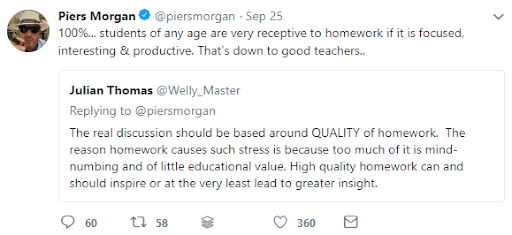
The question quickly becomes what would Piers think of as being ‘interesting’ homework, and if all four of his children would agree upon the same thing being ‘interesting’.
That’s the problem.
One would imagine Piers would find it hard enough finding one task to satisfy the interest of all of his four children – it’s almost impossible to find a task that will engage the interest of 30 or more children in their out of school hours.
Each with different emotional, behavioural and learning needs, then sprinkle in the varying levels of poverty each family suffers (be it financial or in terms of time), and you can see how it isn’t just about being a good or bad teacher – whatever that means – in regards to being able to set Morgan-approved homework tasks.
What does this mean for my child?
Ultimately, the question at the top of mind whenever a parent thinks about homework is a more general one – am I doing the best for my child?
Although the world is changing at a faster pace than ever before in human history, what’s best for children hasn’t changed that much (if at all).
One-to-one support is best, and young people benefit most from adult-child conversations where they acquire new vocabulary and language structures to form and share their thoughts and opinions.
These insights – that one-to-one support is best and that regular, structured adult-child conversations are life-changing within a child’s development – are what inspired us to create Third Space Learning.
A platform where children can engage with a community of specialist tutors in a safe, structured learning environment where they are able to engage in one-to-one conversations that enable them to progress in their learning with confidence.
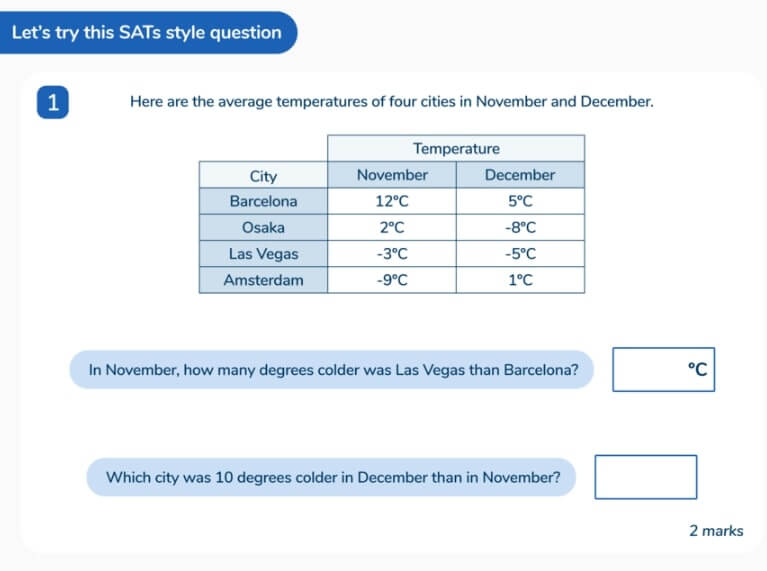
- How to help your child with their maths homework – A parents guide
- The Best Homework Hacks: 18 Tips And Tricks To Help Busy Parents Get It Done Faster!
- The 20 Most Recommended Teaching Blogs for UK Teachers and School Leaders
DO YOU HAVE STUDENTS WHO NEED MORE SUPPORT IN MATHS?
Every week Third Space Learning’s maths specialist tutors support thousands of students across hundreds of schools with weekly one to one tuition designed to plug gaps and boost progress.
Since 2013 these personalised one to one lessons have helped over 150,000 primary and secondary students become more confident, able mathematicians.
Learn about our experience with schools or request a personalised quote for your school to speak to us about your school’s needs and how we can help.
Related articles
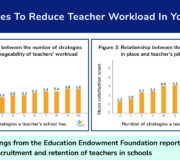
Teacher Workload Reduction: 7 Strategies School Leaders Can Implement Today

Has Teaching Post-Covid Lockdown Felt Different? You Are Not Alone

Making The Transition From Primary To Secondary School During Lockdown

SLT School Leadership Toolkit for Headteachers and Subject Leaders
The Ultimate Guide to Effective Maths Interventions [FREE]
Find out how to plan, manage, and teach one to one (and small group) maths interventions in primary and secondary schools.
Includes a 20 point checklist of techniques to improve your one to one teaching.
Privacy Overview
- Video Explanations
- Printable Worksheets
- ArgoPrep for Families
- ArgoPrep for Educators
- Promoting Learner Variability
- Purchase Workbooks
- SHSAT Program
- What is SHSAT?
- Reading Comprehension
- SHSAT Test Dates
- SHSAT Test FAQ
- SHSAT Practice Test
ENTER BELOW FOR ARGOPREP'S FREE WEEKLY GIVEAWAYS. EVERY WEEK!
FREE 100$ in books to a family!
Pros and Cons of Homework: The Great Homework Debate
1) enforcing discipline, 2) increased learning, 1) prevents outside growth, 2) causing stress, the bottom line, alternatives.
There are many pros and cons of homework. If you remember back to your childhood, one of the most annoying parts of school might have been homework. Many of dreaded having to get home, because instead of doing something fun, we had to whip out the textbook and start doing some problems – not a great way to have to spend the afternoon. We didn’t understand the importance of homework, we saw it as a chore. The same is true of children today.
Homework has been heavily debated for years, with popular opinion shifting in and out of favor over the generations. As both a teacher and a mother, I have mixed feelings on the issue. On one hand, I know the importance of skill practice. However, I also know how crucial it is for children to have time for play and exploring interests outside of school.

Thankfully, I think there is a way to settle the ‘great homework debate’ by finding better alternatives.
Pros and Cons of Homework: The Good
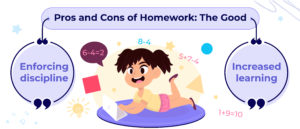
The most influential part of homework is the habits it instills in students. In class, students are not often challenged to study and learn on their own; they are instead guided. With homework, students must force themselves to get the work done on their own time, instilling discipline and habits of work.
Discipline is especially relevant when these students start to work and, eventually, consider college. If they lack important studying habits, they will struggle in the self-lead world of college. But homework isn’t the only way teachers and parents can help children be more disciplined.
There are many other ways to strengthen this ability as well. One being providing structure and two, teaching problem-solving skills.

Believe it or not, homework does help the student to learn the subject faster and with higher accuracy. In fact, scientific research shows there is no ‘math gene’ that makes people good at math. Instead, it takes practice.
When students approach high school, the amount of work assigned per night slowly rises. Additionally, the amount of work a student can handle with positive results raises over time as well. A high school student and an elementary schooler can’t handle the same amount of homework, which is why it is assigned in different quantities.
The benefits of homework start to degrade after two hours for high schoolers, an hour and a half for grades 7-9, 45 minutes for grades 3-6, and 15 minutes for grade k-2. So instead of getting rid of homework altogether, teachers can focus on assigning a reasonable amount of what really matters.
Pros and Cons of Homework: The Bad
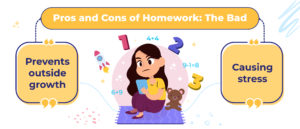
Excessive amounts of homework can take away from a student’s free time to engage in other activities. My middle schooler has struggled with this as tons of homework got in the way of doing what she loves, singing.
From sports to work to hobbies and clubs, there is a variety of things outside of homework that’s worth a student’s time. Finding balance is key. This can often be accomplished through schedule and routine.
Along with preventing outside growth, homework can lead to not just a full schedule, but a packed one. It is no secret this generation’s children are pressured more than any in the past to excel. From travel sports for elementary schoolers to thousand-dollar tutoring sessions to endless college visits – the stress is mounting.
Add homework on top of all this work, and the student is going to feel stressed out. The key is helping them feel successful while not overworking them at such a young age. I’ve found that a great way to do this is by making studying fun! If your child is one that hates math or doesn’t see the importance of reading , using interactive alternatives to study time is important.

Introducing MATH! Grade 4 by ArgoPrep: 600+ Practice Questions

Introducing MATH! Grade 6 by ArgoPrep: 600+ Practice Questions

Introducing MATH! Kindergarten Math 500+ Practice Questions
I know you may be thinking, I don’t assign the homework, I don’t have control. But most teachers are flexible and will work with you if you explained how other practice alternatives are helping your child.
I think the proper way to go about handling the issue of homework is not full support or a complete ban, but a middle-ground approach.
Most of the cons of homework come from an excess of it, while most pros are from homework in moderation. It is clear homework helps, at least to an extent, and too much is indeed a bad thing. We can’t coddle our kids forever, but it’s irresponsible to force a 45+ hour work week on students.
If we want students to succeed, we need to add in extra work when they need it. We also need to include it in a personalized manner to work their weak spots and hold their interest.
- 30,000+ Practice Questions
- 500+ Video Lectures
- 15,000+ Video Explanations
Get up to 70% off on Yearly and Lifetime plans.
15 minutes a day keeps your child’s brain sharp!
Homework is boring, we all know it, so why not look for a better option? Sometimes, students do need an extra push of outside learning to succeed; homework alone might not just be enough. ArgoPrep’s new K-8 math program might be the solution you need. Keep extra work useful, and with purpose, that’s why ArgoPrep’s service is such a great addition, it adds in what you need when you need it.
Shipping calculated at checkout.
- - Unlimited access to all K8 printable worksheets and answer sheets.
- - Premium access to K-8 Math and ELA Video Lectures, Drills and Practice questions.
- - Progress tracking for your child.
- - One premium access to all family members!
The Great Homework Debate
“I left it on the bus.” “My computer didn’t save.” “My backpack got stolen.” “My desk caught fire last night! Thankfully, my dad put it out, but my homework burned up.” Some students never have to rack their brains for such creative (err, true?) stories as to why their homework isn’t complete. Why? Because they never have homework! Let’s take a look at both sides of this debated approach to education.
The Case for Homework
Continued learning: Homework reinforces what is taught in class and gives kids a chance to continue learning outside the classroom. Hands-on practice: Students get to solve problems and make a hands-on attempt at what was discussed in class. Life lessons: Aside from the topics students are studying, homework teaches valuable lessons like discipline, time management, and the importance of practicing. Progress gauge for students: Students can track their own progress. Homework makes it easy for them to identify what they know and what they need to work on. Progress gauge for teachers: Homework also makes it easier for teachers to see how well students understand the lessons and determine who may benefit from additional help. Parental awareness: When students complete assignments at home, it gives parents a chance to see what their kids are learning and how well they seem to understand the material. Since teachers aren’t present, homework also encourages students to go to their family members with questions when they need help. College prep: Homework builds good study skills and helps prepare students for college, especially when completing writing assignments.
The Case Against Homework
Lack of time: Between class and extracurriculars, students are already working the equivalent of a full-time job. It’s important for students’ mental health to spend the remaining time in their weeks with family and friends or pursuing a hobby. Health concerns: At a time when obesity is at an all-time high, homework requires kids to spend more time sitting and takes away from time that could be spent being active. Active playtime is not only associated with increased overall health , but also higher levels of safety awareness, character development, and academic achievement. Burnout: 23% of elementary school teachers and 45% of high school teachers say they see signs of homework-related stress in their students. Not only does homework increase stress and negative feelings toward school, it also takes away from time to decompress. Achievement gap: Not every home is a suitable learning environment, and not every parent is willing and able to help their kids with homework. Homework widens the achievement gap, putting students from low-income families at a disadvantage, as parents are less likely to have free time to spend with students. In fact, “ inability to complete homework” is cited as a contributing factor in students’ decisions to drop out of school. Lack of evidence: There is no concrete evidence that homework contributes to improved academic success below the high school level. At the high school level, studies offer debatable results.
Ways to Compromise
Flipped classrooms: In a flipped classroom , the traditional learning approach is reversed: Instruction is delivered outside the classroom, often in the form of videos students watch at home. Traditional “homework” activities are completed in the classroom. Flipped classrooms offers several benefits:
- Teachers are available to offer guidance, so students aren’t relying on parents when they get stuck.
- Watching videos takes all students approximately the same amount of time, versus traditional homework which may take some students many times longer than their peers.
- When students are absent from class, they can catch up faster.
- Time in the classroom can be spent digging deeper into material, since students come to class with a baseline understanding of the topic.
Quality, not quantity: The National PTA recommends the 10-minute homework guideline—students should not be assigned more than 10 minutes of homework per day per grade level (so first grade = 10 minute max, fourth grade = 40 minute max, etc.). Yet many students are completing two to four times this amount every night. If homework is assigned, the focus should be on assigning a small amount of high-quality work. There are two sides to every debate. Only time will tell which direction the homework pendulum swings. But one thing is for sure: Just because something is “the way we’ve always done it,” doesn’t mean it can’t be reconsidered.
Originally posted on Skyward’s Advancing K12 blog
WSIPC is a non-profit cooperative that provides technology solutions (including Qmlativ ), services, and support to K-12 schools. WSIPC’s purpose is to help schools do more with every dollar and to empower them with the tools to work smarter. To learn how your district can become part of the WSIPC Cooperative, contact us at [email protected] or 425.349.6600.
WSIPC. Inspired by education. Empowered by technology. TM

The Liberty Champion
The official student newspaper of Liberty University
Is Homework Really Necessary?

Did you get all your homework done?
We’ve all heard that phrase one too many times before, and now it triggers your fight-or-flight response. Every waking thought is about an assignment you should be doing or that project you really should start but you just can’t bring yourself to face it. Is all this homework really necessary?
Unfortunately, it just might be. Is the homework itself the problem, or is it the amount we end up with after classes are over for the day and your bed is looking really comfy? To figure all this out we have to remember why we get homework in the first place and what school would be like without it.
In the very early 1900s, homework was actually considered unhealthy for children and was classified as child labor because it interfered with their ability to do chores around the house. The U.S. Department of Education called homework a tool for “boosting educational quality” when it was reinstated, and it became mandatory in 1986 after being rejected for so long, as recorded by the University of San Diego.
It’s always good to look at the pros and cons of something when deciding how you feel about it. So, what does homework do for us? Quite a few things actually.
First let’s address the elephant in the room. No one enjoys homework unless you’re a camp and outdoor adventure leadership (COAL) major. We all have something we would rather spend our time on; that’s just the way it is.
However, when that test rolls around, most of us are glad we stayed late at the library until we understood what we were reading. According to the University of San Diego, students only absorb 50% of what they hear in a class lecture. If that’s all you had to learn from, keeping your GPA above a 3.5 would be considered a superpower.
Whether we like it or not, homework helps us retain important information and truly grasp the concepts we are studying. Hearing about it once from your professor is great, but life as a college student is so busy that your chances of remembering everything you heard in all of your classes are next to none. Repetition is the key to retention, and other than experience training, studying the material you were given and doing your homework is how you’re going to graduate.
Then why is it such a problem? Why is it affecting people so negatively? No degree is worth your mental health; it’s time to look at the cons of homework.
I believe the real problem with homework is the amount of it. Yes, we need it to learn, but our brains can only handle so much at a time. Oftentimes the standard college workload demands that we push our minds past the limit or face a late penalty. This is what causes the exhaustion and resentment that we constantly push through for the sake of good grades and gold chords.
Studies conducted by the American Psychological Association and the U.S. Department of Health say shorter study sessions per day and more consistency over a longer period of time is the best way to retain information while not pushing yourself to your mental limit. However, there is so much to be done that studying for a mere three hours a day isn’t even practical.
Students would actually be able to study in a healthy way and retain information long term if we were not assigned and asked to complete in one week what psychological studies say should take at least two.
So, to answer the question: Yes, homework is definitely necessary. The real problem is how much we are required to process in such a short time.
As finals inch closer by the day, make a point to take care of your mind and give yourself breaks not only while studying but also from other things that can cloud your brain like social media. Coping with huge workloads is a process, so make lists, take deep breaths and get to bed on time. We’re gonna make it; I promise.
Barber is the off-campus news editor for the Liberty Champion
Leave a Reply Cancel reply
Your email address will not be published. Required fields are marked *
- Share full article
Advertisement
Supported by
I Didn’t Truly Know My Mother Until I Cooked With Her
To connect with a parent who awes (and occasionally intimidates) everyone around her, the Times reporter Priya Krishna spends time with her in the kitchen.

By Priya Krishna
My mother and I were not the “Gilmore Girls.”
Growing up, I didn’t open up to her about the people I had crushes on, the friend groups that were on the outs or who was invited to whose bat mitzvah.
But I did help her cook. Every day, when she came home from the office, I’d set up my textbooks on the kitchen island and pretend to do my homework, while really, I was gazing at my mother, the inimitable Ritu Krishna, as she deftly sizzled spices in ghee and smacked the valve of the pressure cooker closed with a spoon when it whistled. Partway through her cooking, I’d be summoned to wash chiles, chop cilantro or taste the food for salt.
We are opposites, my mother and I. Where she is poised, classy and no-nonsense, I am goofy, outgoing, a people pleaser. My whole childhood, we struggled to find common ground. We weren’t just from different generations. My mother was an immigrant from India; I was an American kid trying to navigate the world without a language to understand my identity. It was also very intimidating to have a mother who wakes up looking as if she just got a blowout, who is deeply admired by all her friends and co-workers, and who doesn’t wear deodorant because she, in her own words, “doesn’t smell.” I didn’t know how I would ever live up to the standards she set for me, let alone for herself.
But when she cooked, she was at her most accessible — changed out of whatever fashionable outfit she had worn that day, her hair pulled back with a clip, bobbing her head to Abba or Strunz and Farah as she nursed a glass of wine. In the kitchen, our relationship hummed.
On my birthday, we would make a chocolate cake from a Betty Crocker dessert cookbook together, decorating the top with rose petals and doilies. When I was gifted a children’s cookbook with a recipe for “green spaghetti” ( pesto ) — we made it one night and marveled at what would become our new favorite pasta sauce.
Recipe: Tea Sandwiches
My mother worked for airlines, which allowed our family to travel often. During my childhood, we visited countries like Egypt, Italy, Morocco and China. Upon returning from any vacation, we would discuss the dishes we had eaten — dainty tea sandwiches in England, cardamom cream-soaked shahi toast in India, crunchy and satisfying onigiri in Japan — and figure out a way to recreate them at home.
Recipe: Salmon Onigiri
I don’t think I realized it at the time, but cooking was one of the few ways we could really understand each other. As I got older, I became only more angsty, more rebellious, more frustrated by our generational and cultural differences. Yet I still wanted to cook alongside her, and she still wanted my company in the kitchen. Maybe she didn’t get the social significance of a grand prom-posal , and maybe I didn’t get why she wouldn’t let me drive with music on, but we both understood that this pot of beans would be greatly enhanced with a drizzle of tamarind chutney and a fistful of chopped red onion.
I was socialized to want a mother who was my best friend. Instead, I got one who awed, inspired and slightly terrified me. It took me a long time to appreciate her for who she is. But our path to mutual appreciation was paved in the kitchen. There’s something about cooking together — doing menial, repetitive tasks like washing vegetables or measuring spices (not that my mother did any measuring) — that makes conversation and connection easier. It lowers the stakes.
Recipe: Shahi Toast
Since those kitchen island days, you could say we’ve taken our cooking relationship to the next level. We’ve spent several years working together on two cookbooks and now, when the two of us talk on the phone, we usually start by discussing what we last cooked in great detail. We debate the particularities of roasting lemon slices versus sautéing them, and which brand of almond butter is the best. It’s our shared language, a way to check in with one another that’s separate from work or relationships.
Food has always been a central part of my life because it didn’t just open up a world of different cuisines — it opened up the world of my mother.
Follow New York Times Cooking on Instagram , Facebook , YouTube , TikTok and Pinterest . Get regular updates from New York Times Cooking, with recipe suggestions, cooking tips and shopping advice .
Priya Krishna is a reporter in the Food section of The Times. More about Priya Krishna
More on Food and Dining
Keep tabs on dining trends, restaurant reviews and recipes..
These three easy techniques to cook asparagus can bring out the delicious best from the spring favorite.
Queso fundido, a gooey thrill and a staple at many Mexican restaurants, has deeper roots as an essential appetizer during carne asadas, with a back story rooted in the Mexican Revolution .
What’s the best way to salt scrambled eggs ? Kenji López-Alt explains why paying close attention to timing can help you avoid a watery mess.
Seafood caught in nearby waters has long been left out of the farm-to-table movement. But these people have set out to get it into stores and restaurants .
Eating in New York City
We asked, you answered: Here are the restaurants our dining-obsessed readers would rank the best in the city.
Pete Wells, our dining critic, has unveiled his annual ranking of the 100 best restaurants in New York City .
At Shaw-naé’s House on Staten Island, the owner and chef Shaw-naé Dixon serves up Southern classics and a warm welcome to her “living room.”
Once the pre-eminent food court in Flushing, Queens, for regional Chinese cuisines, the Golden Mall has reopened after a four-year renovation. A new one in Manhattan is on the horizon.
Challengers Review; Paramount Pres Out; And The Great Sasquatch Debate - ORC 5/1/24 Mike, Mike, and Oscar
- TV & Film
What Is This Episode - Top of Show . BOX OFFICE REPORT/FILM REVIEWS: Challengers Wins the Weekend, AM Reviews - 1:29 Abigail is Fun, Review - 8:41 Ministry of Ungentlemanly Warfare Needs Box Office Help - 10:55 AlsoMike’s Long Awaited Sasquatch Sunset Review - 14:53 . INDUSTRY NEWS: Bakish Out at Paramount; Sale Coming Soon. - 19:03 Participant Closing Its Doors - 23:13 Tony Noms Have Hollywood Tie-Ins - 29:54 . AWARDS CALENDAR UPDATE - 36:25 . FILM FESTIVAL UPDATES: Cannes Adds Oliver Stone Doc; Other Notable Misses - 39:13 Sundance Could Make Decision to Leave Utah This Year - 42:00 . TRAILER REACTIONS: Mufasa Teaser #1 - 45:45 Atlas Trailer #1 - 47:52 Longlegs Teasers - 52:03 (And M1 on Late Night w/ The Devil) Touch Trailer #1 - 55:56 The Exorcism - 57:35 . . Your Homework/LEAVE US 5 STARS! - 1:00:25 Words of Wisdom/What’s Coming Next - 1:01:25
- Episode Website
- More Episodes
- All rights reserved
Top Podcasts In TV & Film
- International edition
- Australia edition
- Europe edition

The Anxious Generation wants to save teens. But the bestseller’s anti-tech logic is skewed
There’s no doubt about the mental health crisis facing young people. Jonathan Haidt blames our devices – which oversimplifies the problem
I n the introduction to his new book The Anxious Generation , titled “Growing up on Mars”, Jonathan Haidt tells a fanciful piece of science fiction about a child conscripted into a dangerous mission to the red planet that will deform the young person as they grow. The journey is undertaken without the parents’ consent. The ham-fisted metaphor is that technology companies have done the same to children and teenagers by putting smartphones into their hands.
Haidt, a New York University professor of ethical leadership who researches social psychology and morality, goes on to argue that smartphones ignited a wildfire of anxiety and depression in gen Z around the world, by granting them “continuous access to social media, online video games, and other internet-based activities”. He says there are four foundational harms in this degradation of youth: social deprivation, sleep deprivation, attention fragmentation, and addiction.
“This great rewiring of childhood, I argue, is the single largest reason for the tidal wave of adolescent mental illness that began in the early 2010s,” he writes.

The Anxious Generation has squatted atop the New York Times bestseller list for four weeks now and garnered florid, positive reviews – it hit a nerve . But it has also sparked fierce debate over the effects of our now ubiquitous devices, the causes of mental illness, and just what to do about the kids. Haidt’s critics argue that he took advantage of very real phenomena – depressed and anxious children, overattachment to technology, disconnection from other humans – to make a broad indictment of smartphones, when it’s not as simple as that.
We can split The Anxious Generation into two parts: the first details the supposed digital destruction of childhood around the world, while the second recommends ways to fix it.
There is, in fact, a crashing wave of teenage anguish. Studies in Haidt’s book and elsewhere show an alarming surge in teenage depression, anxiety and suicide attempts from 2010 to 2023. This is happening at the same time as widespread social media and smartphone adoption. The psychologist Jean Twenge, an associate of Haidt, asked in 2017 on the cover of the Atlantic: “ Have smartphones destroyed a generation? ” In the fall of 2021, a “national emergency in child and adolescent mental health” was declared by the American Academy of Pediatrics, the American Academy of Child and Adolescent Psychiatry and the Children’s Hospital Association.
But as the University of California, Irvine, psychology professor Candice Odgers asked in her critique of The Anxious Generation in Nature , “Is social media really behind an epidemic of teenage mental illness?”
The answer, per Odgers, is no. Blisteringly, she accuses Haidt of “making up stories by simply looking at trend lines” and says his book’s core argument “is not supported by science”. Haidt makes the basic error of mistaking correlation with causation, she says.
In a review of 40 previous studies published in 2020, Odgers found no cause-effect relationship between smartphone ownership, social media usage and adolescents’ mental health. A 2023 analysis of wellbeing and Facebook adoption in 72 countries cited by Odgers delivered no evidence connecting the spread of social media with mental illness. (Those researchers even found that Facebook adoption predicted some positive trends in wellbeing among young people.) Another survey of more than 500 teens and over 1,000 undergraduates conducted over two and six years, respectively, found that increased social media use did not precede the onset of depression.
For Haidt to draw such a sweeping conclusion as “teens troubled, ergo smartphones bad” from such unsettled science is wrong, Odgers argues. He engages in post hoc, ergo propter hoc reasoning: after this, therefore because of this. The irony is palpable –Haidt himself has argued in his own academic research that “moral reasoning is usually a post hoc construction” that follows a judgment already made. His fellow scientists now say his book falls into the same trap in pronouncing that immoral technology has corrupted the youth of today. The Oxford psychology professor Andrew Przybylski told the tech newsletter Platformer : “Extraordinary claims require extraordinary evidence. Right now, I’d argue he doesn’t have that.” The Stetson University psychology professor Christopher Ferguson said Haidt’s book was fomenting moral panic about social media reminiscent of the debate over video games and real-world violence.
“Overall, as has been the case for previous media such as video games, concerns about screen time and mental health are not based in reliable data,” Ferguson noted in a 2021 meta-analysis of more than 30 studies that found no link between smartphone or social media use and poor mental health or suicidal ideation.
Responding to social scientists’ critiques of his book on the New Yorker Radio Hour, Haidt said, “I keep asking for alternative theories. You don’t think it’s the smartphones and social media – what is it?”
Haidt was making an appeal to ignorance, a logical fallacy: an alternative is absent, ergo my hypothesis is correct. Simply because there are no other explanations for the deterioration of the mental health of teenagers on the bestseller list right now does not mean his book is right – a drought of certainty does not mean the first idea we find is water. And scientists and doctors have, in fact, put forward ideas that compete with his , or else acknowledged smartphones as part, but not all, of the problem.
What’s more, The Anxious Generation barely acknowledges the effect of school closures during the pandemic had on kids and teens’ mental health and development, the Washington Post technology reporter Taylor Lorenz pointed out on her podcast . The Anxious Generation includes graphs showing that adolescent mental health grew even worse beginning in 2020, but Haidt insists that the pandemic was only an accelerant to an already raging fire caused by smartphones.
“The mess is not because of Covid. It was baked in before Covid. Covid didn’t actually have a long-lasting impact,” he said in a podcast interview with a fellow NYU professor, Scott Galloway.
A rebuttal in the language of a TikToker: be so for real. Studies definitively say that school closures due to the coronavirus pandemic caused and continue to inflame mental distress among children and teenagers. These disruptions hindered students’ social and emotional development, academic progress and physical health, multiple researchers have found, without equivocation . Worse still, studies have found that these measures did little to limit the spread of coronavirus as much as they hurt young students, an ineffective tradeoff.
Haidt needed to substantively contend with the problems caused by lockdowns and school closures, which are correlated with the worst period of teen suffering in the last 15 years, to give real, current solutions to the mental health crisis among youth. He offers little in that regard.
I f the first part of Haidt’s book – teens suffering, phones to blame – reads as sensational generalization, the second half is full of recommendations you have probably heard before, because Haidt cites nationwide professional associations of doctors and authorities.
The Anxious Generation proposes four solutions to the epidemic: “No smartphones before high school. No social media before 16. Phone-free schools. Far more unsupervised play and childhood independence.” With the exception of age-gating policies, these are not unreasonable things. Schools have seen remarkable results when they ban smartphones . Many educators are in favor of such prohibitions. Teenagers do struggle with appropriate use of social media , and many say it makes them feel worse about themselves. Allowing children playtime free of surveillance does not seem beyond the pale. Parents limiting children’s phone use before bed and in the early morning, as Haidt advises, is decent counsel.

The American Academy of Child and Adolescent Psychiatry goes a step further, advising that parents themselves should attempt to model the habits of screen time they wish to see in their children.
That same organization that declared a mental health emergency among young people offers a measured approach to technology and teens in general: “Screens are here to stay and can offer many positives,” its website reads. But Haidt can see none of these positives in smartphones or social media, an unrealistic attitude. He rightfully points out that social media can be a nightmare of compare and despair, of the fear of missing out. The other side of the same coin is that it forms aspirational and inspirational communities, and outlets for creativity. Smartphones are likewise tools of productivity for young people: in 2012, squarely in the years that Haidt says the ruination of childhood began, Reuters reported that more than a third of surveyed American teenagers were doing homework on their phones. “Influencer” has become a derisive term, but the job of creating content for social media has minted a generation of young business owners . And how do you think the teenage students of Marjory Stoneman Douglas high school organized a global movement against gun violence?
Children have always inhabited worlds that seem foreign and foreboding to their parents – the internet is one such place. It is unsettling and unfamiliar to those who did not grow up with it. What The Anxious Generation does successfully is smooth on a salve over the hurt of being disregarded by a loved one in favor of a phone. It provides an answer to the painful parental question of “Why is my child ignoring me? Why are they spending so much time online and alone in their room?”
But the question of teen mental health is complicated and resistant to any single explanation. And overlooking all that smartphones can be for teens and adults – maps, digital cameras, novels, encyclopedias, Walkmen and whatever else Haidt dismisses as “other internet-based activities”– is a reductive understanding of our devices as mere gaming and gabbing machines. In 2024, these devices contain our lives .
I was reminded of Haidt’s book on the subway the other night. A woman asked her daughter in the seat next to her a question. Her daughter did not answer; she was staring at her phone playing a game. The woman’s smile faded. They did not speak for another minute. Then the daughter handed her mother the phone and looked her in the eyes: it was the mother’s turn in the game. The woman looked at the phone and laughed at something the young girl had done, some funny misstep or a clever move. They both smiled. Though only an anecdote, it did remind me of the possibility of connection, both online and off.
- Social media
- Smartphones
- Mobile phones
- Mental health
- Parents and parenting
Most viewed

IMAGES
COMMENTS
The debate over homework has been going on for decades, with the pendulum swinging back and forth between more and less homework for American students. Adding new fuel to the debate is that today's kids are getting more homework in earlier grades. "The amount of homework that younger kids - ages 6 to 9 - have to do has gone up ...
During the 1960s, homework fell out of favor because many though it inflicted too much stress on kids. In the 1970s and 1980s, we needed more homework to keep up with the Japanese economically. More recently, as everything about education and teachers is being scrutinized, homework has come into question again.
Tim Walker, "The Great Homework Debate: What's Getting Lost in the Hype," neatoday.org, Sep. 23, 2015: 4. University of Phoenix College of Education, "Homework Anxiety: Survey Reveals How Much Homework K-12 Students Are Assigned and Why Teachers Deem It Beneficial," phoenix.edu, Feb. 24, 2014: 5.
A TIME cover in 1999 read: "Too much homework! How it's hurting our kids, and what parents should do about it.". The accompanying story noted that the launch of Sputnik in 1957 led to a push ...
Q&A. Expert answers by. Harris Cooper Hugo L. Blomquist Distinguished Professor Emeritus of Psychology and Neuroscience, Duke University. Dr Harris Cooper is an Emeritus Professor of Psychology and Neuroscience at Duke University in North Carolina. Dr Cooper, whose work has spanned five decades, is best known for his research into homework and ...
Common perceptions and misnomers about homework and what really defines it. What do teachers and parents think about it and the realities regarding educating...
October 10, 2023. Amy Vaughan-Roland, Ed.D. Ed.D. in Leadership. As your students file out of your classroom, you quickly shout, "Don't forget to complete pages four and five tonight for homework!". You sigh wondering if that homework will get done. It's the great debate, to assign or not assign homework, that is the question.
The authors believe this meritocratic narrative is a myth and that homework — math homework in particular — further entrenches the myth in the minds of teachers and their students.
It is a long-debated issue with passionate proponents and opponents. Should elementary students have homework? How much homework is appropriate for middle schoolers? How much time is the average U.S. high schooler spending on homework each night? ... Show Navigating Your Child's Education: A Podcast for Parents, Ep The Great Homework Debate ...
The great homework debate: While some experts say homework leads to good study habits, others say it has little bearing on academic success, By Kate Thayer PUBLISHED: August 9, 2018 at 1:35 p.m ...
Many earlier laws limiting homework were abolished, and the longterm trend toward less homework came to an end. The debate re-emerged a decade later when parents of the late '60s and '70s argued that children should be free to play and explore — similar anti-homework wellness arguments echoed nearly a century earlier.
Hands-on practice: Students get to solve problems and make a hands-on attempt at what was discussed in class. Life lessons: Aside from the topics students are studying, homework teaches valuable lessons like discipline, time management, and the importance of practicing. Progress gauge for students: Students can track their own progress.
The great homework debate: Too much, too little or busy work? ... There is a sharp debate among parents about homework. The National PTA recommends 10 minutes of homework per night per grade level .
The Great Homework Debate: How Much Is Too Much? Even prior to schools going 'temporarily' virtual in 2020, kids across the board were being assigned more homework than any previous decade ...
New research into working memory might give teachers fresh perspective in the great homework debate. Well-designed homework might make new words and concepts easier to learn, because the right kind of practice can reduce differences between high- and low-working-memory students.
The website Focus on Effectiveness cites several studies showing that in elementary school, homework helps build learning and study habits (Cooper, 1989; Cooper, Lindsay, Nye, & Greathouse, 1998; Gorges & Elliot, 1999). Also noted is the point that 30 minutes of daily homework in high school can increase a student's GPA up to half a point ...
A study of teenagers used by The Telegraph shows that American high-schoolers spend an average of 6.1 hours per week compared with 4.9 hours per week of homework each week for UK-based teens. Up until 2012, the Department of Education recommended an hour of homework a week for primary school Key Stage 1 children (aged 4 to 7) and half an hour a ...
1) Enforcing discipline. 2) Increased learning. Pros and Cons of Homework: The Bad. 1) Prevents outside growth. 2) Causing stress. The bottom line. Alternatives. There are many pros and cons of homework. If you remember back to your childhood, one of the most annoying parts of school might have been homework.
Homework is a polarising topic among students, teachers and parents. The research shows that the impact varies based on lots of different factors. ... The big debate Homework is a polarising topic. It can cause students to feel stressed or anxious. It adds extra pressure on teachers, who are often already struggling with their workloads. And ...
Homework has also been shown to help teach students to work independently, encourage responsibility and develop good study habits. ... Teacher to Teacher: The Great Homework Debate. Fellman, Sandra. Teaching Pre K-8, v34 n5 p6 Feb 2004. Numerous studies testify to the powerful link between homework and improved student achievement. Homework has ...
The Great Homework Debate. Feb 11, 20. Twitter Facebook LinkedIn Pinterest Email Copy Link ... Homework widens the achievement gap, putting students from low-income families at a disadvantage, as parents are less likely to have free time to spend with students. In fact, ...
In this thought-provoking video, we delve into the ongoing debate surrounding homework and its impact on students. Is homework an essential part of the learn...
While there is no set homework policy at Yurkew's school, daily work (homework, class participation, and in-class assignments) makes up about 33 percent of a student's overall quarter grade.
In the very early 1900s, homework was actually considered unhealthy for children and was classified as child labor because it interfered with their ability to do chores around the house.
To connect with a parent who awes (and occasionally intimidates) everyone around her, the Times reporter Priya Krishna spends time with her in the kitchen.
Challengers Review; Paramount Pres Out; And The Great Sasquatch Debate - ORC 5/1/24 Mike, Mike, and Oscar TV & Film What Is This Episode - Top of Show. BOX OFFICE REPORT/FILM REVIEWS: Challengers Wins the Weekend, AM Reviews - 1:29 ... Your Homework/LEAVE US 5 STARS! - 1:00:25 Words of Wisdom/What's Coming Next - 1:01:25. Episode Website ...
The Stetson University psychology professor Christopher Ferguson said Haidt's book was fomenting moral panic about social media reminiscent of the debate over video games and real-world violence.